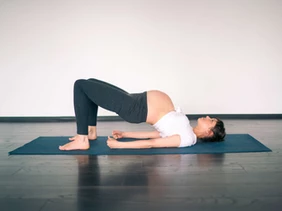By Kelli Wrolstadt, PT, DPT, OCS
Women who are pregnant are frequently given advice about what they should and should not do regarding their health. Friends, family, and social media usually mean well, but they often provide contradictory advice without the backing of research. This is especially true in the exercise realm, where many pregnant women are unsure of whether it is smart or even safe to exercise while they are pregnant.
However, every pregnant woman (without contraindication*) should be physically active during pregnancy.

Exercise during pregnancy has been shown to provide important health benefits for women, including:
- Reduces risk of gestational diabetes and hypertension
- Reduces maternal weight gain
- Less likely to need a C-section
- Less likely to have fetal macrosomia (>8lbs)
- Reduces risk of postpartum depression
- Potentially reduces the length of 1st and 2nd stages of labor
These benefits make it obvious that pregnant women should continue, or start, moving their bodies, but where to begin?
1. Things to Avoid
Once pregnant, you should discontinue any contact sports, including high-risk activities like skiing/snowboarding/etc. You should also monitor how you feel during exercise and monitor for any adverse reactions. This may include pelvic pain/leaking/heaviness, coning/doming of the abdominals, or excessive fatigue. If you do experience any of these symptoms, a pelvic health physical therapist can help you modify problematic exercises.

2. Consider your prior levels of function
Were you an ultra-marathon runner or a neighborhood walker? Were you an Olympic powerlifter or did you sometimes do push-ups? Depending on your level of fitness before pregnancy, you are going to need to start at a place that is unique to you and your fitness level. If you were active during pregnancy, you can likely continue with a very similar exercise program once pregnant. If you are new to exercise, start small and progress as much as able! Start with even just 5 minutes a day and build up as you can.

3. Exercise Recommendations
- 150 minutes/week of moderate-intensity exercise
- Be active at least 3 days/week
- Incorporate a variety of aerobic and resistance-type exercises

Pregnant women are resilient and strong and should be empowered to start or continue with exercise throughout pregnancy. Exercise is a powerful medicine that results in a healthy, happy mama and baby.
If you have any questions, concerns, or adverse symptoms with exercise, schedule an appointment with a pelvic health physical therapist!
*If you have the following symptoms/diagnoses, talk to your OBGYN before starting an exercise program: unexplained persistent vaginal bleeding, ruptured cervix, triplets +, pre-eclampsia, placenta previa after 28 weeks, uncontrolled gestational diabetes, uncontrolled hypertension, or uncontrolled thyroid issue, recurrent pregnancy loss, history of spontaneous preterm birth, twins after 28 weeks, malnutrition or eating disorder




